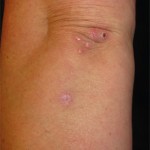NEW YORK (Reuters Health)—Itch intensity in moderate to severe plaque psoriasis can be substantial, and may be on a par with the notoriously itchy skin condition atopic dermatitis, new research suggests.
“Both conventional wisdom and some of our classic dermatologic textbooks have stated that psoriasis is not particularly itchy,” corresponding author Dr. Alexa B. Kimball of Beth Israel Deaconess Medical Center tells Reuters Health by email.
“Itch can be an incredibly problematic and debilitating aspect of psoriatic disease,” Dr. Kimball says, and the role of pruritus in psoriasis has emerged as an important symptom that researchers are more consistently including as an outcome measure (measured by itch scores) in clinical trials.
She notes that as a result of conducting clinical trials and looking at itch data for both psoriasis and atopic dermatitis—the latter condition so extraordinarily itchy that it is sometimes called “the itch that rashes”—she was struck by how similarly both types of patients described their itch intensity.
To test this observation, Dr. Kimball and coauthor Dr. Kathryn T. Shahwan conducted a systematic review and meta-analysis using pooled data from randomized trials studying systemic therapies to treat adults with moderate to severe plaque psoriasis or atopic dermatitis.1
The meta-analysis included data from 22 randomized clinical trials that had baseline pruritus data on a 10- or 100-point numerical rating or a visual analogue scale. Nine of the trials involved 848 patients with atopic dermatitis, and the other 13 trials involved 9,249 with psoriasis.
The weighted mean baseline pruritus scores were 63.03 for psoriasis and 62.87 for atopic dermatitis, a nonsignificant difference.
“Itch intensity as described by patients with moderate to severe psoriasis and atopic dermatitis in clinical trials is almost identical,” Dr. Kimball says.
The finding highlights how important itch is to patients with either condition.
The results “may be surprising to clinicians who do not generally view the degree of itch in these two diseases as similar,” Dr. Kimball notes. “This analysis confirms we should continue to evaluate itch in both diseases, given its substantial impact on treatment satisfaction, quality of life, and function.”
“Everyone knows that eczema, referred to professionally as ‘atopic dermatitis,’ is itchy,” Dr. Ethan Lerner of the Cutaneous Biology Research Center at Massachusetts General Hospital in Boston tells Reuters Health in an email. “What has not been appreciated widely until this century is that psoriasis is often itchy, too.”
Although the meta-analysis found that the intensity of itch was the same for both conditions, the study “was historical or retrospective,” says Dr. Lerner, who was not involved in the research.
It will be important to have a prospective study in which the same investigators examine the itchiness question in parallel sets of patients, he says.
“Personally, I think that the average patient with eczema suffers from more intense itch than the average patient with psoriasis,” Dr. Lerner says. “But what is average?”
However, he notes, the intensity of itch for a psoriasis patient also might depend on which areas of the body are affected. “I … think that if we ask the itch question of psoriasis patients who have scalp or genital involvement, we will find that their itch is as intense and bothersome as the itch of someone with atopic dermatitis.”
Dr. Kimball and Dr. Shahwan report current or past fellowship funding from Janssen. Dr. Kimball also reported that she has been a consultant and investigator for Janssen and several other pharmaceutical companies.
Reference
- Shahwan KT, Kimball AB. Itch intensity in moderate to severe plaque psoriasis versus atopic dermatitis: A meta-analysis. J Am Acad Dermatol. 2017 Jun;76(6):1198–1200.e1. doi: 10.1016/j.jaad.2017.02.002.


